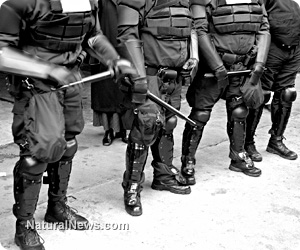
The militarization of campus police
Friday, January 03, 2014 by: J. D. Heyes
Tags: campus police, militarization, American universities
- Newly released JFK files reveal Pentagon's role in creating Lyme disease and covid in the same lab
- DEADLY DECEPTION: How COVID vaccines increased mortality rates and why authorities hid the truth
- CDC finally halts $11 billion COVID funding scam as health officials admit the ‘pandemic’ was a fraud
- Here are TEN all-natural ways to protect your garden without using harmful chemicals
- GAIN-OF-FUNCTION CAT-BIRD-FLU now on the rise as nearly a dozen cats in Colorado "test positive" for Bird Flu due to contaminated cat food
- Ginseng's hidden anti-aging power: How compound K is rewriting the rules of skincare
- “Endgame: The Hidden Agenda 21” unveils a world of conspiracy and control
- Senate Democrats deny censorship industrial complex existed, defend government's role in silencing dissent
- ATTENTION PRESIDENT TRUMP: Please WITHDRAW your nomination of Dr. Susan Monarez for CDC Director as she is a VAX FANATIC and TOXIC JAB ZEALOT
- Scientists demand FDA withdraw mRNA COVID vaccines amid contamination and gene therapy concerns
- L.A.'s rebuilding nightmare: Only 4 permits issued after fire destroys 6,000 homes
- “The shame of Minnesota”: Somali immigrants behind $250 million child nutrition fraud in largest COVID-era scam
- Former Congresswoman exposes CCP's deep infiltration of California through universities, ports, and fentanyl
- Despite surge in MMR vaccination in Texas, measles outbreaks continue: Is VACCINE SHEDDING fueling the spread?
- PROCESSED TABLE SALT in foods found to fuel depression
- Chewing gum's dirty secret: How your daily habit could be flooding your body with microplastics
- BPA: The hidden hormone disruptor sabotaging your health - and how to fight back
- Judicial bias exposed: Judge who blocked Trump's gang deportations attended secretive left-wing conference
- Newly released JFK files reveal Pentagon's role in creating Lyme disease and covid in the same lab
- Analysis: The coming economic collapse, a mass uprising and Trump's three secret weapons to halt the growing revolt
- Festive flavors: The sweet history, nutritional profile and health benefits of pecan pie
- Elon Musk: Aliens could be here on Earth RIGHT NOW
- Trump reverses course on Gaza plan, says “nobody is expelling Palestinians”
- Big Pharma's $8 Billion bribery scheme exposed: how doctors are pushed to prescribe junk science, not heal
- Boys are back in town: Trump’s patriotic alpha crew takes the wheel while toxic females ride in the backseat
- Reclaim your health: How midlife exercise reverses years of inactivity
- A lack of integrity in Academia: Harvard professor found GUILTY of fraudulent research to promote CRT theory
- Survival 101: Effective EMF blocking techniques
- EPA advisor admits the agency is funneling billions to climate groups ahead of Trump’s return to White House
- Dr. Mike Yeadon releases 15-minute testimony - WATCH - about genocidal intent of COVID “vaccines”
- 5 Simple steps to boost your brainpower: How to strengthen executive function in a distracted world
- Florida takes a stand: DeSantis proposes permanent ban on mRNA vaccine mandates
- Sugarcane extract superior to cholesterol-lowering drugs?
- Mike Adams Sermon 66: God will DESTROY ISRAEL for its wickedness
- Pilots report mysterious lights 'moving at extreme speeds' across Oregon skies
- Space war brewing? Russia threatens to destroy Starlink satellites
- EPA advisor admits the agency is funneling billions to climate groups ahead of Trump’s return to White House
- California's social media censorship law struck down: A victory for free speech or a threat to online safety?
- The Health Ranger releases “Vaccine Zombie” song and music video, using AI-animated zombies for the music video
- Dr. Mike Yeadon releases 15-minute testimony - WATCH - about genocidal intent of COVID “vaccines”
- The pandemic as a tool for INDOCTRINATION: Understanding “The Indoctrinated Brain” by Dr. Michael Nehls
- Newly released JFK files reveal Pentagon's role in creating Lyme disease and covid in the same lab
- Florida takes a stand: DeSantis proposes permanent ban on mRNA vaccine mandates
- Mike Adams releases country western hit single: Goin’ Back in Time is Comin’ Home
- Mike Adams releases music poetry sensation: A Child of God
- “Why we influenced the 2020 elections”: Facebook files reveal the coordinated effort to bury the Hunter Biden laptop story
- Unpacking the Lies That We’ve Been Fed – new song and music video released by Mike Adams, the Health Ranger
- RFK Jr. clears key hurdle: Sen. Susan Collins backs controversial HHS nominee, signaling a new era for health policy
- Mike Adams releases new song and music video: Nothing More Disgusting Than a Globalist
- Michigan sheriff announces criminal investigation into 2020 election crimes, Dominion Voting Systems
- Israeli soldiers accused of even more torture and abuse in the West Bank
- Migrants are taking advantage of recent hurricanes to scam residents and loot their homes
- House Intelligence Committee calls for the ARREST and PROSECUTION of Dr. Anthony Fauci
- Rep. Nancy Mace introduces bill to ban biological males from female facilities on federal property
- Red Cross issues warning to stop blood plasma donations from vaccinated people
- Scientists confirm: GENIUS brain function can be spontaneously unleashed in humans without any apparent cause
- EPA advisor admits the agency is funneling billions to climate groups ahead of Trump’s return to White House
- HYSSOP: What research reveals about the health benefits of this ancient holy herb
- Two containers with completed ballots fall out of truck in Florida
- Fully vaccinated about to see “tsunami” of illness and death, warns virologist
- Global leaders unite to clamp down on “misinformation” with UN-backed Cascais Declaration
- BREAKING: 2025 NDAA authorizes mandatory military draft of WOMEN across America… as Pentagon pursues global NUCLEAR war with both Russia and China at the same time
- Michael Yon warns of a ZIONIST TAKEOVER in Trump’s second administration
- BOMBSHELL: DNA testing kits are a SCAM to develop ethnic-specific bioweapons
- Ozempic and Wegovy weight loss drugs are injectable LIZARD VENOM PEPTIDES that may unleash a devastating wave of organ failure… side effects align with symptoms of SNAKE BITES
- Israeli soldiers accused of even more torture and abuse in the West Bank
- These 13 countries just signed an agreement to engineer a global FAMINE by destroying food supply
- NASA admits that climate change occurs because of changes in Earth’s solar orbit, and NOT because of SUVs and fossil fuels
- RFK Jr. clears key hurdle: Sen. Susan Collins backs controversial HHS nominee, signaling a new era for health policy
- Sermon 30: How Jesus reveals Caesar’s FAKE CURRENCY and FALSE AUTHORITY
- Coriander seeds: Ancient medicine backed by modern science
- Arizona officials claim Maricopa County needs 10-13 days to tabulate results of the election
In many respects, that attack ended our age of innocence, so to speak; never again would Americans view themselves as ultimately safe from the kind of havoc that we witness daily in foreign lands. So some additional "beefing up" of police was understandable.
But when a growing number of departments began routinely fielding vehicles and gear that once served soldiers on the battlefield - far and away more gear than was realistically needed to combat potential terrorism - alarms began sounding. And now, even more red flags are going up over the growing power, influence and militarization of police on the nation's college campuses, as reported by the University Herald:
Already considered an actual police force on the campuses they patrol, college departments are becoming more and more empowered, a trend that does not seem to be slowing.
According to the Associated Press, many colleges and universities say strict campus jurisdictions are becoming increasingly arbitrary. This has led to several campus police departments expanding their limits to neighboring towns, including areas with off-campus housing buildings.
'It used to be we were responsible for the campus'
Naturally, the expansion of authority off-campus has supporters - and critics. Proponents say it is good, because it allows colleges to keep a closer watch on students whose behavior off-campus is less than desirable, which then makes it easier to refer them for disciplinary actions and proceedings. The expanded scope also gives college cops more flexibility to investigate crimes committed on campus by citizens and members of the surrounding community, thereby easing the workload of increasingly cash-strapped local municipal departments.
"It used to be we were responsible for the campus. Now there's an expectation, I think, especially with parents, but to a large extent among students, that we're also responsible for these areas off campus," Jeff Corcoran, interim chief of the University of Cincinnati police force, whose officers patrol areas near the school, told The Associated Press. "We're getting pushed to ignore those imaginary lines on the map and be more proactive in that area."
But the expanded territory - and scope of authority - for university police has generated some concerns in the nation's capital, where residents are complaining that campus cops do not have the same level of training or transparency requirements as D.C. Metro police. In Washington, campus officers have arrest powers while on campus; however, they attend a shorter training academy that is separate from the one which D.C. police attend.
Also, colleges are generally not required by public records laws to release some of the same information to public institutions and government agencies, making some residents concerned about accountability.
"If one of their policemen acted inappropriately, there would be hardly any recourse. We'd have no information, no follow-up," said Ken Durham, a longtime resident of Foggy Bottom, the neighborhood that surrounds George Washington University, one of several colleges considering expanded powers for campus police.
"Expanding the police powers of a university police force without some kind of clear and transparent mechanism is a really bad idea," adds Marina Streznewski, president of the Foggy Bottom Association.
Buying vehicles designed to withstand IED attacks
The larger debate over the role of campus police comes amid incidents of violence at some institutions over the past few years. That includes the 2007 shootings at Virginia Tech.
But also, other major crimes - like that of the child sex abuse that occurred with a respected coach involved in Penn State's storied football program - are sparking consideration, as well as universities' obligations to report criminal activity under the federal Clery Act.
In addition to expanding their authority and scope, universities are beginning to expand their arsenals and gear - to include military surplus, as reported by Christopher White of the University of Missouri:
While some universities, in attempts to keep a lookout for lone-wolf shooters, have spent millions of dollars on a vast array of campus security cameras, other campuses have considerably beefed up their police force tools with urban-warfare tanks - in effect creating little armies.
Ohio State University and Columbia, Mo., home of the University of Missouri, are two such examples.
Both universities have purchased armored vehicles of the types used recently in Afghanistan and Iraq. The vehicles were designed to protect occupants from improvised explosive devices.
Sources:
http://www.universityherald.com
http://www.huffingtonpost.com
http://www.thecollegefix.com
Campus police at FETCH.news
Get independent news alerts on natural cures, food lab tests, cannabis medicine, science, robotics, drones, privacy and more.
Take Action: Support Natural News by linking to this article from your website
Permalink to this article:
Embed article link: (copy HTML code below):
Reprinting this article:
Non-commercial use OK, cite NaturalNews.com with clickable link.
Follow Natural News on Facebook, Twitter, Google Plus, and Pinterest
Science News & Studies
Medicine News and Information
Food News & Studies
Health News & Studies
Herbs News & Information
Pollution News & Studies
Cancer News & Studies
Climate News & Studies
Survival News & Information
Gear News & Information
News covering technology, stocks, hackers, and more



"Big Tech and mainstream media are constantly trying to silence the independent voices that dare to bring you the truth about toxic food ingredients, dangerous medications and the failed, fraudulent science of the profit-driven medical establishment.
Email is one of the best ways to make sure you stay informed, without the censorship of the tech giants (Google, Apple, Facebook, Twitter, YouTube, etc.). Stay informed and you'll even likely learn information that may help save your own life."
–The Health Ranger, Mike Adams













































